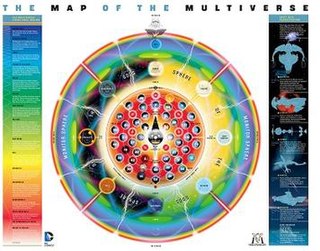
Alternate history is a genre of speculative fiction of stories in which one or more historical events occur and are resolved differently than in real life. As conjecture based upon historical fact, alternative history stories propose What if? scenarios about crucial events in human history, and present outcomes very different from the historical record. Alternate history also is a subgenre of literary fiction, science fiction, and historical fiction; as literature, alternate history uses the tropes of the genre to answer the What if? speculations of the story.
The multiverse is a hypothetical group of multiple universes. Together, these universes comprise everything that exists: the entirety of space, time, matter, energy, information, and the physical laws and constants that describe them. The different universes within the multiverse are called "parallel universes", "other universes", "alternate universes", or "many worlds".
Reality is the sum or aggregate of all that is real or existent within a system, as opposed to that which is only imaginary. The term is also used to refer to the ontological status of things, indicating their existence. In physical terms, reality is the totality of a system, known and unknown.

A fictional universe, or fictional world, is a self-consistent setting with events, and often other elements, that differ from the real world. It may also be called an imagined, constructed, or fictional realm. Fictional universes may appear in novels, comics, films, television shows, video games, and other creative works.
A parallel universe, also known as a parallel dimension, alternate universe, or alternate reality, is a hypothetical self-contained plane of existence, co-existing with one's own. The sum of all potential parallel universes that constitute reality is often called a "multiverse".
Convergence may refer to:
The universe is all of time and space and their contents.
An alternative universe is a setting for a work of fan fiction that departs from the canon of the fictional universe that the fan work is based on. For example, an AU fan fiction might imagine what would have taken place if the plot events of the source material had unfolded differently, or it might transpose the characters from the original work into a different setting to explore their lives and relationships in a different narrative context. Unlike typical fan fiction, which generally remains within the boundaries of the canon set out by the source material, alternative universe fan fiction writers explore the possibilities of pivotal changes made to characters' history, motivations, or environment, often combining material from multiple sources for inspiration.
Within Marvel Comics, most tales take place within the fictional Marvel Universe, which in turn is part of a larger multiverse. Starting with issues of Captain Britain, the main continuity in which most Marvel storylines take place was designated Earth-616, and the Multiverse was established as being protected by Merlyn. Each universe has a Captain Britain designated to protect its version of the British Isles. These protectors are collectively known as the Captain Britain Corps. This numerical notation was continued in the series Excalibur and other titles. Each universe of the Multiverse in Marvel also appears to be defended by a Sorcerer Supreme at nearly all times, appointed by the mystic trinity of Vishanti to defend the world against threats primarily magical in nature from within and beyond and bearing the Eye of Agamotto.
Parallel universe often refers to parallel universes in fiction, a self-contained separate world, universe or reality coexisting with the real world, which is used as a recurring plot point or setting used in fantasy and science fiction.
The multiverse is the hypothetical set of multiple possible universes that comprise all of reality.

Alternate Realities is a 2000 omnibus collection of three short science fiction novels by American writer author C. J. Cherryh: Wave Without a Shore (1981), Port Eternity (1982), and Voyager in Night (1984). All three novels are set in Cherryh's Alliance-Union universe and share a common theme of people encountering and coping with a reality different from their own.
Dream worlds are a commonly used plot device in fictional works, most notably in science fiction and fantasy fiction. The use of a dream world creates a situation whereby a character is placed in a marvellous and unpredictable environment and must overcome several personal problems to leave it. The dream world also commonly serves to teach some moral or religious lessons to the character experiencing it – a lesson that the other characters will be unaware of, but one that will influence decisions made regarding them. When the character is reintroduced into the real world, the question arises as to what exactly constitutes reality due to the vivid recollection and experiences of the dream world.

In DC Comics, the Multiverse is a "cosmic construct" composed of the many fictional universes the stories of DC take place in. The worlds in this multiverse share a space and fate in common, and its structure has changed several times in the history of DC Comics.
A shared universe or shared world is a fictional universe from a set of creative works where more than one writer independently contributes a work that can stand alone but fits into the joint development of the storyline, characters, or world of the overall project. It is common in genres like science fiction. It differs from collaborative writing in which multiple artists are working together on the same work and from crossovers where the works and characters are independent except for a single meeting.
The multiverse is a series of parallel universes in many of the science fiction and fantasy novels and short stories written by Michael Moorcock. Central to these works is the concept of an Eternal Champion who has potentially multiple identities across multiple dimensions. The multiverse contains a legion of different versions of Earth in various times, histories, and occasionally, sizes. One example is the world in which his Elric Saga takes place. The multiplicity of places in this collection of universes include London, Melniboné, Tanelorn, the Young Kingdoms, and the Realm of Dreams.
Metaverse is the sum of all virtual spaces.



